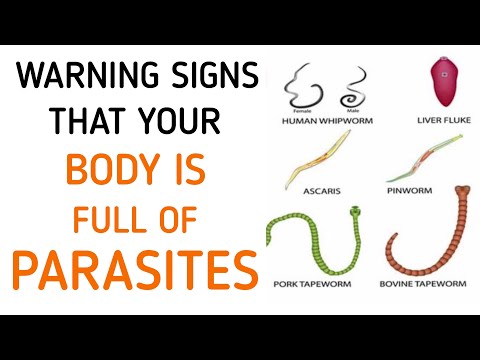Parasites are organisms that survive by feeding on a host. When they infect humans, they can trigger a wide range of health problems. Understanding parasites in people symptoms is important because many cases go unnoticed until they become severe. Doctors often encounter patients with parasitic infections, and the most common cases share specific signs that everyone should be aware of. Learning about these symptoms, causes, and treatments helps people recognize problems early and seek proper medical care.
Why Parasites Affect Human Health
Parasites can enter the human body through contaminated food, water, soil, or direct contact with infected individuals. They can live in the intestines, blood, tissues, or even under the skin. Since they depend on their host for survival, they often damage organs and weaken the immune system. Doctors report that many infections remain hidden for months because the symptoms are mild or mistaken for other conditions.
Common Parasites Doctors Encounter in Patients
Doctors worldwide see several types of parasites in people. Each type comes with its own set of risks and symptoms. The most common include:
Protozoa – single-celled organisms like Giardia and Plasmodium (which causes malaria).
Helminths – larger worms such as tapeworms, roundworms, and flukes.
Ectoparasites – organisms like lice, mites, and ticks that attach to the skin.
Identifying the specific type is the first step in treating the condition effectively.
General Parasites in People Symptoms
Not all infections look the same, but doctors highlight several recurring signs. These include:
Digestive Problems
Persistent diarrhea
Abdominal cramps or bloating
Nausea and vomiting
Loss of appetite
Parasites often thrive in the gut, leading to irritation and nutrient absorption problems.
Fatigue and Weakness
Constant tiredness despite rest
Muscle aches
Low energy during daily activities
The body spends energy fighting the parasite, leaving the person drained.
Skin Reactions
Itching or rashes
Red bumps or sores
Allergic reactions without clear causes
Some parasites live under the skin or trigger immune responses that show up on the surface.
Weight and Nutritional Changes
Sudden weight loss
Malnutrition
Anemia due to blood loss from parasites like hookworms
Doctors often detect iron deficiency or vitamin shortages linked to parasitic infections.
Neurological and Mental Health Signs
Trouble sleeping
Irritability or mood changes
Difficulty concentrating
While rare, some parasites can affect the brain and nervous system.
Symptoms Linked to Specific Parasites
Each parasite can create unique health issues. Doctors commonly treat these specific conditions:
Giardia Infection
Greasy, foul-smelling stools
Severe stomach cramps
Bloating after meals
This parasite spreads through contaminated water and often affects travelers.
Tapeworm Infection
Visible segments in stool
Unexplained hunger or lack of appetite
Nutrient deficiencies
Doctors find tapeworm cases in people who consume undercooked meat or fish.
Malaria
High fever with chills
Sweating episodes
Severe headaches
Caused by mosquito bites, malaria remains a major global health issue.
Pinworms
Intense itching around the anus
Restless sleep
Irritability in children
Pinworm infections are among the most frequent cases doctors treat, especially in schools.
Hookworms
Anemia and weakness
Coughing due to lung migration
Painful rash on feet from larval entry
Hookworms enter through soil, making barefoot walking risky in some areas.
How Doctors Diagnose Parasites in People
Accurate diagnosis is crucial. Doctors usually perform:
Stool tests to identify eggs or parasites.
Blood tests to detect immune responses or malaria parasites.
Endoscopy or colonoscopy for internal checks.
Imaging tests like ultrasound for larger parasitic cysts.
Doctors also consider travel history, diet, and hygiene habits before confirming the condition.
Treatment Methods Doctors Use
Treatment depends on the type of parasite. The most common approaches include:
Antiparasitic Medications
Albendazole, mebendazole, or praziquantel for worm infections.
Metronidazole or tinidazole for protozoa.
Antimalarial drugs for Plasmodium.
Doctors adjust doses based on age, weight, and severity of infection.
Supportive Care
Iron supplements for anemia.
Hydration solutions for diarrhea.
Nutritional therapy to restore lost vitamins and minerals.
Lifestyle and Hygiene Advice
Wash hands regularly.
Cook meat and fish thoroughly.
Drink filtered or boiled water.
Wear shoes outdoors in risky environments.
When to See a Doctor for Parasites in People Symptoms
Not every stomach ache or rash points to parasites, but people should seek medical help if they experience:
Persistent digestive issues lasting more than a week.
Unexplained weight loss or fatigue.
Severe itching around the anus or skin irritation.
Fever, chills, or night sweats with recent travel history.
Doctors stress early treatment to prevent long-term damage.
Prevention Tips That Reduce Parasite Risk
Avoiding infection is always better than treatment. Doctors recommend:
Practicing safe food handling.
Washing fruits and vegetables before eating.
Avoiding untreated water from lakes or rivers.
Keeping nails trimmed to reduce the spread of pinworm eggs.
Maintaining clean bedding and clothing.
Prevention strategies not only protect individuals but also reduce the spread in communities.
Why Recognizing Parasites in People Symptoms Matters
Parasitic infections remain a serious health challenge worldwide. Many people ignore early signs, allowing the problem to grow. By learning the parasites in people symptoms doctors treat most often, individuals can take action at the right time. Doctors emphasize that most infections respond well to treatment when detected early. Staying alert to changes in health, practicing hygiene, and seeking professional advice ensures a stronger defense against these silent invaders.



 :
:









